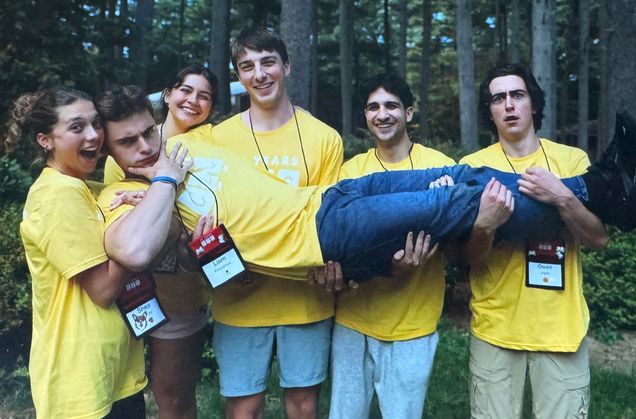Student Spotlight – Liam Fitzpatrick
The loss of a parent or sibling is, unfortunately, something that one in 12 children go through , and Kilachand senior Liam Fitzpatrick (CAS’25) falls into this category.

He more than understands the deep need for support through childhood grief, and was lucky enough to experience such support as a part of Comfort Zone, a free weekend camp for grieving kids, after losing his father at a young age.
“I remember the first camp I ever went to, campers were encouraged to share their stories, and I decided as soon as I got there that I didn’t need to share, nobody needed to know what I’ve gone through.
“Comfort zone gave me the space where I was allowed to say, ‘I don’t feel fine about this whole grief thing. I wish I had somebody there to teach me how to shave or show me how to drive or take me to a Giants game. The value came from having a place where I could say those things and then be surrounded by kids who’ve experienced those same feelings and could then empathize,” he said.
Fitzpatrick credits his approach to positive masculinity through grief to his Big Buddy in the Comfort Zone program, Alex. Because of the positive impact that connection had, he became a Big Buddy volunteer himself.
“Growing up male in the U.S., there’s a lot of pressure to just be fine with grief,” he explained.
“I knew I wanted to be a big buddy at some point because my relationship with my Big Buddy was formative in my development of what it means to be positively masculine, what it means to show your emotions effectively, and what it means to communicate.”
That’s where he envisioned a Keystone Project recruiting volunteers to the cause.
“I went to my first camp [as a Big Buddy] around the time I was taking the proposal workshop, and I’d been wrestling with a couple of different topics [related] to grief. I thought maybe I wanted to do something related to masculinity and grief in general,” he explained.
“I realized that one of the great benefits of a Keystone Project is that it lets you do something that wouldn’t be done in a traditional disciplinary background. A project like this, I probably wouldn’t get approved by the political science department because it’s not political science enough, the psychology department because it’s not psychology enough or the social work department because it’s not social work enough. Kilachand allows me to do this weird, interdisciplinary, less measurable [thing].”
Even more, Fitzpatrick saw the intense need for more positive role models for male Little Buddies at Comfort Zone, where, a month from the Fall 2024 camp in Massachusetts, there were only 17 male Bigs for the 40 male Littles.
He recognizes the hesitancy to volunteer — grief is far from an easy topic to approach — but he wants people to know that, by simply showing up and having a good time, they can make a great Buddy.
“You’re not going there as a big buddy to fix the kid that you’re with,” Fitzpatrick said. “If your [Little Buddy] wants to tell you their story, that’s great. If your kid wants to, just like, play wiffle ball all day, that’s great, you’re playing wiffle ball all weekend. Your job is to be the most fun person at the camp.”
“What’s really impactful, speaking from personal experience, was [my Big Buddy] being willing to play basketball with me for four hours at once. That was what made it fun, and then I could go to the healing circle and be [better in that] environment,” he continued.
Through Fitzpatrick’s first round of recruiting efforts, he was able to surpass the goal of reaching 40 Big Buddies, which he attributes to “warm conversations.”
What has surprised him, though, is how word has spread, even beyond his closest circles.
“This past fall, five of my friends and I went and volunteered at Comfort Zone. I was kind of anticipating like they would enjoy it, and then I’d be able to use their experience to talk to some of my friends,” Fitzpatrick said.
“What I hadn’t anticipated was them then going out and talking to other people, [even] people I don’t know, and they’re from all over the place…It has been super fulfilling knowing that the project will extend beyond me and my friends,” he expressed.
Like he said in his Keystone On Tap presentation at the end of Fall semester, childhood grief isn’t slowing down. The further the recruiting can spread, the more Little Buddies can have positive, life changing experiences like Fitzpatrick did.
He shared Comfort Zone’s volunteer page and interest form for those looking to find out more and wanting to get involved.